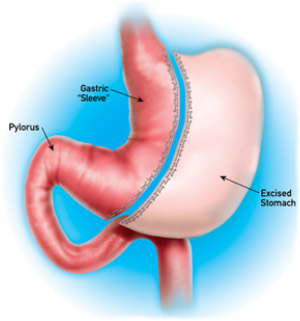
Minimally Invasive Sleeve Gastrectomy
Gastric sleeve surgery, sometimes also referred to as sleeve gastrectomy surgery or vertical sleeve gastrectomy, is a popular weight loss solution because it is designed to help you to feel fuller, thus eliminating your desire to eat as much or as often.
Patient Journey
From beginning to end, the journey for a patient undergoing bariatric care is full of changes. It will require persistence and discipline, but in the end, it is all worth it. Feel free to learn more about the patient journey.
With gastric sleeve surgery, we remove approximately 70 - 80% of your stomach, leaving a “sleeve” of the stomach. The surgery reduces the volume of your stomach, thus making you feel full more quickly. The section of your stomach that is responsible for producing the hormone Ghrelin is taken out. This hormone stimulates feelings of hunger, so after the procedure, you can be confident that your hunger levels and thus your food intake will decrease. Patients usually lose approximately 70% of their excess weight with the sleeve gastrectomy. In certain patients, we can do this with a single incision in your belly button, so a scar is barely noticeable. The New York Bariatric Group is proud to be among the first and only surgeons in the area that now offer virtually scarless single incision sleeve gastrectomy, or gastric sleeve surgery, performed completely through the umbilicus. This results in improved cosmesis and quicker recovery when you choose sleeve gastrectomy. Another benefit to vertical sleeve gastrectomy is that most patients usually spend only one night in the hospital, while the recovery time for bypass surgeries is longer. Ask your surgeon if you qualify for the new virtually scarless SILS sleeve gastrectomy.
Gastric sleeve surgery is a simpler procedure to perform than gastric bypass, resulting in lower complications and faster recovery times. Because we are not changing the gastrointestinal tract, it decreases the chances of complications like vitamin deficiencies that occur with gastric bypass surgery. Patients can lose weight similar to gastric bypass surgery, over a significantly shorter time. Also, the section of your stomach that is responsible for producing the hormone Ghrelin is taken out. This hormone stimulates feelings of hunger, so after the procedure, you can be confident that your hunger levels and thus your food intake will decrease. The surgery also reduces the volume of your stomach, thus making you feel full more quickly.
Another benefit of this surgery is that your stomach will continue to function normally. As a result, you can still eat most of your favorite foods with no worries about suffering from dumping syndrome, which is characterized by abdominal discomfort and other related symptoms. You also do not have to worry about foreign bodies being implanted in you, as is the case with lap band surgery. One reason the gastric sleeve results are so positive, is when we do the operation, we take out a section of your stomach that produces a hormone called Ghrelin. Ghrelin is known as the hunger hormone. It stimulates feelings of hunger, so when we remove this portion of the stomach, our patients find their hunger levels drop, and it is easier to eat less. Additionally, we are removing about 70 – 80% of your stomach, so the stomach is able to hold a smaller volume of food. For this reason, patients tend to eat less and feel full more quickly. Another reason patients like sleeve surgery is that the stomach will continue to function normally. Because of this, you can still eat most of your favorite foods with no worry about suffering from a side-effect called dumping syndrome, which sometimes happens after gastric bypass surgery. Dumping syndrome is characterized by abdominal discomfort and other related symptoms.
Gastric sleeve resection is considered a new operation and therefore long-term data is not available. Because a long tube is created with a lot of resistance, it does severely limit the amount of food that a patient can eat. Sleeve gastrectomy does have higher complication rates than the adjustable gastric banding procedure, due to the risk of leaks or bleeding from the staple lines. The gastric sleeve procedure is also irreversible. Any form of gastric surgery carries risks; we are happy to go over these with you and you may ask any questions you might have so that you can feel confident about your weight loss procedure decision. Any form of gastric surgery carries risks, but we do these operations because when the patients are chosen carefully—and the surgeons are as experienced as the ones at New York Bariatric Group—the benefits outweigh the risks.
- The Insurance experts at the New York Bariatric Group will verify your insurance benefits for you free of charge.
- The first step is to call or contact us to make an appointment with one of the experienced surgeons at the New York Bariatric Group.
- As a candidate for bariatric surgery, you can expect to undergo a series of consultations and evaluations. A detailed comprehensive program has been developed to ensure your long-term health and safety pre- and post-surgery.
- Dr. Garber explains how you can initiate the process to become a new healthier you.
- You will receive extensive patient education from our psychologist who will perform a psychological evaluation that is required by the hospital and most insurance providers.
- Meet with our registered dietitian to discuss healthy lifestyle changes pre- and post- weight loss surgery.
- Participate in studies to determine your pulmonary, gastrointestinal, and cardiovascular health. You can usually complete this entire work-up in one day in our office.
- After the work-up is completed you will meet with your surgeon for a second visit to be scheduled for surgery. Our insurance experts will then obtain approval from your insurance company.
- You will be scheduled for preadmission testing at the hospital. During this testing you will meet our bariatric coordinator who will give you a complete educational class on how to prepare for surgery? What is going to happen when you arrive at the hospital on your surgery day, as well as what to expect when you go home from the hospital.
It is important to remember that The New York Bariatric Group and its affiliate Bariatric Center has been recognized as a “MBSAQIP and its Accredited Center-Comprehensive”. This designation provides the public with the assurance that our practice provides complete care for patients before, during, and after bariatric surgery, and we have a proven track record verified by an independent review organization.
Based on this designation, we have proven that your hospital stay, will provide all that is necessary for a fast and pleasant recovery. From our full time bariatric nurse coordinator to specialized equipment that is needed to fulfill the needs of patients post-bariatric surgery, including bariatric chairs, beds, gowns, and other specialized equipment. At the end of your hospital stay, you will find that our program is designed solely for the purpose of the bariatric patient.
The surgery usually takes only 35-40 minutes and is performed under general anesthesia. You will usually spend one night in the hospital. On the first morning after the surgery you will undergo a GI series to make sure everything looks good. You will then be started on a liquid diet and advanced to a pureed diet for lunch. Most patients will go home around lunch time.
Recovery Period
The recovery period after Sleeve Gastrectomy surgery is usually just 3 -5 days until you can return to work. With the virtually scarless (SILS) single incision technique, you can sometimes return to work sooner.
After Bariatric Surgery Lifestyle Changes
Adjusting to your post bariatric surgery diet and lifestyle is one of the most important keys to your long-term success. Develop healthy daily habits based on eating in moderation that match your new body instead of failed eating patterns that can ultimately lead to poor health, fatigue, depression, and attempts at binge eating. Making a commitment to lifestyle change will bring fast & substantial weight loss. Let us show you how.
Is permanent weight loss after bariatric surgery possible? Absolutely! But you aren’t going to find weight loss success by merely having restrictive weight loss surgery. Get thin quick schemes are a dime a dozen. They are usually costly plans that promise fast weight loss. They work too – temporarily. The problem with fast weight loss plans alone is they are not long-term solutions to losing weight and keeping it off.
Tips To Avoid Feeling Deprived While Dieting (Even Before Entering Our Program)
- Learn and adhere to a sensible diet plan
- Think lifestyle change rather than sticking with the diet mentality
- Find new and exciting ways to stay motivated
- Indulge in your bariatric treats once in a while
- Find enjoyment in activities other than eating
- Reward yourself for reaching weight loss goals, but not with food.
- Connect with friends and ask for support
- Be accountable for your eating, even on your down days.
- Eat small meals at specific schedules to avoid feeling hungry
- Don’t skip meals
- Create lighter versions of your favorite meals that you can enjoy eating
Post bariatric surgery diet guidelines are fully discussed with patients during their comprehensive nutritional evaluation prior to surgery. Patients follow a Stage I diet for the first 4-6 weeks after surgery. This includes all foods that are soft, mushy, and/or pureed consistencies. Examples of pureed foods are anything blended and smooth such as baby foods, fruitless yogurt, cottage cheese, and hummus. Soft/mushy foods include chopped up ground meats such as turkey, veal, chicken or pork, soft, white, flaky fish that is baked, broiled or grilled, scrambled eggs, and egg whites. Solid foods of all kinds should be completely avoided until weeks 4-6 or when the surgeon allows it.
This practice stresses the importance of good hydration, using non carbonated, decaffeinated, sugar free beverages. We always promote good quality proteins to be consumed from day one after bariatric surgery. High sugar and high fat foods are limited and very specific guidelines are provided to help equip patients with a clear-cut way to determine which foods are healthy for them to eat.
Fruits, vegetables, and high fiber foods are reintroduced after the first 3 months. All patients get full details on dietary progression from our experienced nutritionists at their follow up visits.
The New York Bariatric Group is fully dedicated to promoting high standards for nutritional health. That doesn’t mean that patients should not enjoy eating. The New York Bariatric Group weight loss program has been designed to help patients lose weight rapidly, but provides you with resources to help enjoy your new lifestyle by keeping the flavor and fun in eating. Each patient is given the option to enroll in our Store. We brought together great tasting meals and supplements for breakfast, lunch, dinner, and even snacks which can be ordered on our website.
